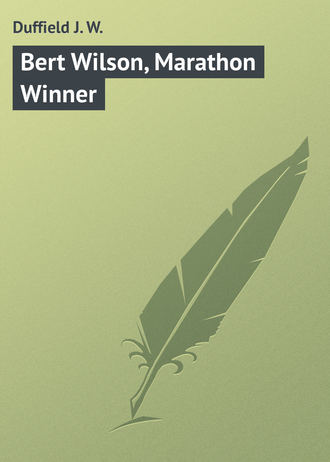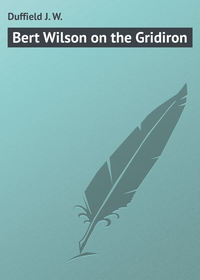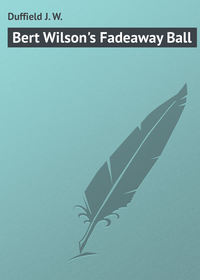 полная версия
полная версияBert Wilson, Marathon Winner

J. W. Duffield
Bert Wilson, Marathon Winner
CHAPTER I
With Flying Feet
A thundering cheer burst from ten thousand throats, as the three athletes, running like deer, swung into the stretch and straightened away for home.
It was the last day of the intercollegiate meet for field and track events, and the most thrilling feature had been reserved for the wind-up. It was a modified Marathon of fifteen miles and the fastest runners in the East had entered the lists. Each college had sent the pick of its runners to struggle for the mastery, and excitement was at fever heat.
The stands were a mass of color, packed with the partisans of the various contenders and “rooting” fiercely for their favorites. The different events – pole vaulting, hammer throwing, broad and high jumping – had been bitterly contested, and the victories had been only a matter of inches. And now with the minor features disposed of, all eyes were centered on the most important of all – the long distance race.
A splendid body of athletes, twenty in number, had faced the starter, and at the crack of his pistol had darted off like greyhounds freed from the leash. They formed a magnificent picture of youth and vigor as they sped around the track. For the first mile or two they kept a fairly compact formation; but then the line began to lengthen. Some through weariness, others through craftiness, fell to the rear and let the others make the pace. By the time five miles had been covered, the sifting process began. Brawn and wind and staying power asserted themselves. The weaker or more poorly conditioned dropped out altogether or plodded hopelessly in the rear. At six miles from the finish, only five were left, and when they entered upon the last mile, the race had narrowed down to three.
In the stands Bedlam broke loose. The excitement that had been seething all the afternoon reached its climax. The frantic rooters hurled entreaties and begged their favorites to come on and win. Old “grads” worked themselves into a state bordering on apoplexy, while pretty girls waved their flags and joined their treble to the bass of the men. The tremendous uproar put new life and spirit into the tired racers as they braced themselves for the final sprint.
The race seemed to belong to one of the first two who were running neck and neck. Fifty feet behind came the third. He was tall and splendidly built with the narrow hips and broad chest that mark the thoroughbred. To the ordinary observer he seemed to be out of it, in view of the gap that separated him from the two leaders. An expert, however, would have seen that he was running easily and had himself well in hand. At the half he lengthened his stride almost imperceptibly and reduced the lead to twenty feet.
Then something happened. The steady lope became a sprint; the sprint became a flight. He came down the track like a bullet from a gun, with eyes blazing, head erect and his legs working like piston rods. He seemed to be flying rather than running. Foot by foot he overtook the men in front. They knew from the startled roar of their partisans that he was coming, they heard the rushing feet behind them, and they called on every ounce of strength they had for a last desperate effort. For a moment they held their own, but only for a moment. With a terrific burst of speed that brought the yelling stands to their feet, he passed them as though they were standing still and breasted the tape a winner, in the fastest time ever recorded for the track.
“Wilson,” “Wilson,” “Wilson,” shouted the wearers of the Blue as they poured down over the field in a frantic mob that threatened to engulf him. In a twinkling they hoisted him on their shoulders and carried him about the track while their college songs went booming down the field. They fairly fought to get near him and refused to let him go, until at the clubhouse door he laughingly shook himself loose and went in for his bath and rub-down.
“By the powers,” exclaimed Reddy, the trainer of the team, as he nearly shook his hand off, “you did yourself proud, Wilson, me boy. I’m not denying that me heart was in me mouth when the fellows were showing you the way to the tape. But I kept saying to myself: ‘He’ll know when the time comes to let himself out,’ and sure enough ye did. Ye came down that track in the last lap like the Twentieth Century Express. Ye only hit the high places. I never saw such running in my life.”
“Well,” came the answer laughingly, “I’m sorry I nearly gave you heart failure, Reddy, but we won, and that’s the main thing after all. I never felt worried myself for a minute. I was sure I had the other fellows’ number as soon as I cared to let go. I could see that they’d shot their bolt when we turned into the stretch and I knew I had plenty in reserve. I had my second wind and felt as if I could run all day.”
“They sure were all in when they staggered over the line,” said Reddy. “Brady collapsed altogether and Thornton looked like a ghost. But you’re as fine as silk and haven’t turned a hair. Ye look as though ye could do it all over again,” he went on admiringly as he noticed the elastic step and regular breathing.
“No, thank you,” was the response, “I’m no glutton and I know when I have enough. But now for the shower, Reddy, and then for the training table. I’m hungry as a wolf.”
With his skin glowing and every muscle tingling from the vigorous rub-down, he stepped from the clubhouse only to run the gauntlet of the enthusiasts who had been waiting for him at the entrance. A mighty shout rose and hands without number grasped his or patted him on the back.
“What’s the matter with Wilson?” they queried and the answer came in a rousing chorus: “He’s all right.”
At last he escaped from his rejoicing comrades, and in company with Dick Trent and Tom Henderson, his special chums, started over to the college buildings. The reaction from the terrific strain was beginning to make itself felt. But his heart was filled with exultation. He had fought fiercely. He had fought fairly. And he had fought victoriously. He had won glory for his Alma Mater and carried her colors to triumph. And just at that moment he would not have changed places with the President of the United States or the king of any country in the world.
“Gee, Bert,” said Tom, “that was a wonderful sprint in the stretch. You didn’t have legs; they were wings. Just as the other fellows too were thinking it was all over except the shouting.”
“Yes,” added Dick, “it would have been tall running even for a hundred yard dash. But how you did it after running fifteen miles is beyond me. By George, I wish I had timed you on that last lap. I’d have hated to be in your way as you came tearing down to the line.”
“There might have been a mix-up for a fact,” laughed Bert. “That tape looked awfully good to me and I’d surely have felt peevish if any one had hit it before I did. And it wasn’t any sure thing at that. Thornton and Brady were certainly running some. I looked for them to crack before they did. If they’d had the least bit in reserve, they might have made it hot for me. But they’d killed themselves off in making the pace. I just kept trailing and watching, and when the right moment came I made my run. But they’re dandy runners,” he added, with the generosity that was one of his leading traits, “and in another race they might reverse the verdict.”
“Not in a thousand years,” maintained Tom stoutly. “They never saw and never will see the day they can outrun you. It’s you for the Olympic team all right. There’s no one this side of the ‘big pond’ who can make you take his dust.”
“No,” chimed in Dick, “nor on the other side either. There isn’t a fellow who saw you run to-day that wouldn’t back you to beat anything in Europe and America put together.”
“Not so fast fellows,” remonstrated Bert. “Remember I haven’t even made the team yet. This is only a preliminary tryout for the Eastern cracks. I’ve got to come up against the Western bunch and if all I hear is true they are going ‘great guns’ in practice. Then too they grow some speedy sprinters in the amateur athletic clubs – regular streaks of greased lightning. I may prove only a false alarm when I match my wind and speed against theirs.”
“Yes,” said Tom with fine scorn, “we’ll worry a lot about that, won’t we Dick? Didn’t Thornton hold the American record up to to-day?” he demanded, “and didn’t you run rings around him?”
“But this mightn’t have been his day,” began Bert.
“No,” said Dick mockingly, “it wasn’t. Suppose we say it was Bert Wilson’s day and let it go at that.”
Their faith in Bert could not be shaken, nor was this surprising, since it was founded on repeated incidents in their own experience. Again and again they had seen him put to the test, and he had never failed to measure up to the emergency. Dangers that might have daunted the stoutest heart he had met without quailing. His physical prowess was beyond dispute. He was a typical athlete, strong, quick, muscular, and a natural leader in all manly sports. In most of them he stood head and shoulders above his fellows. He had borne off trophy after trophy on field and track. This alone would have marked him out as one to be reckoned with, but it was only a part of the reason why he was the idol of his friends and comrades.
His popularity lay in the fact that his splendid body held a heroic soul. He was clear grit through and through. His muscles were no more iron than his will. His beaten opponents often grumbled that he had no nerves, but they never questioned his nerve. He faced life with eyes wide open and unafraid. He stood on his own feet, asking no odds and seeking no advantage. He never quit. There was no “yellow streak” in him anywhere. To-day had only been one more illustration of his indomitable will, his bulldog tenacity. Add to this that he was a staunch friend, a jolly “pal,” a true comrade, and there was no mystery as to the feeling his friends had for him.
None felt these qualities more strongly than his particular chums, Tom and Dick. Their friendship was one of many years standing and grew steadily stronger as time went on. Every new experience tightened the bond between them. They had been with him on many occasions, some merely exciting, others attended by personal danger, and none had ever shown the white feather. In all their adventures, Bert had been easily the central figure. When as campers they had had that thrilling automobile race it was Bert’s hand on the wheel that had steered the Red Scout to its glorious victory over the Gray Ghost, its redoubtable rival. In that last heart-breaking game when the “Blues” captured the championship of the college diamond, it was Bert’s masterly pitching of his great ‘fadeaway’ ball that snatched victory from defeat before twenty thousand frenzied rooters. Only a few months before, when acting as wireless operator on that summer evening off the China coast, it was Bert’s quick wit and dauntless courage that had beaten off the pirate attack and sent the yellow scoundrels tumbling into their junks. Small wonder then that they believed in him so fully and refused to concede that he could lose in anything he undertook. Mentally and actually they were prepared to back him to the limit. While delighted at to-day’s victory they were in no way surprised. He “had the habit” of winning.
After supper, where Bert made ample amends for the “short commons” he had been under while preparing for the race, Tom came into the rooms that Bert and Dick shared together, for his usual chat before bedtime.
“Mustn’t keep you up too late, old fellow,” he said as he dropped into a chair. “I suppose you want to hit the feathers early to-night. You must be dead tired after the race.”
“Oh, I’m not especially sleepy,” replied Bert, “just a little lazy. I had such a big supper that I’m doing the anaconda stunt, just now. I’m full and therefore happy. I’m at peace with all mankind. If I’ve an enemy in the world, I forgive him.”
“Well, you haven’t an enemy in this college world just now, you can bet on that,” said Tom. “The fellows are talking of nothing else than the race this afternoon. The whole place is buzzing with it. They’re sure that you’ve cinched your place on the Olympic team beyond all question.”
“By the way,” broke in Dick, “how did this Olympic idea get its start anyway? Who dug it up? Who saw it first?”
“Why,” replied Tom, “it was a Frenchman I believe – de Coubertin or some name like that – who suggested it.”
“That seems queer too,” said Dick. “You don’t usually think of the French in connection with athletics. Of course they’re a great nation and all that, but somehow or other they bring to mind high heels and frock coats and waxed mustaches and button hole bouquets. The men kiss each other when they meet and they cry too easily. They seem a little too delicate for the rough work of the field and track.”
“They do seem a little womanish,” admitted Bert, “but that is only a matter of custom. Don’t think for a minute, though, that there is anything weak or cowardly about the French. There are no finer fighters in the world. They go to their death as gaily as to a dinner. No one will die more readily for an idea. A little theatrical about it, perhaps, but the real stuff is there.”
“Oh, they’re fighters sure enough,” asserted Dick. “They’re something like old Fuzzy-Wuzzy that Kipling tells about;
“‘’E’s all ’ot sand and ginger when alive,And ’e’s generally shammin’ when ’e’s dead.’”“To be sure,” went on Bert, “they had it handed to them good and plenty in 1870. But that wasn’t due to any lack of courage on their part. Both sides fought bravely, but the Germans were better prepared. They caught the French napping.”
“Well,” said Tom, “it was this very affair of 1870 that started de Coubertin in the matter of the Olympic games. He smarted under defeat. He got the idea that his people needed building up physically. It was shy on brawn and muscle. At first he had only the French in mind, but soon his plans took in other nations too. So a big convention of delegates met in Paris and formed an Olympic committee that has carried on the work ever since.”
“When did they hold the first meet?” asked Dick.
“At Athens in 1896,” answered Tom, “and it certainly seemed right that Greece, the scene of the old Olympic games, should have the first chance at the new. And everybody was glad too to have a Greek win the first great Marathon race. The excitable Greeks went wild over it. They gave him all sorts of presents. Some were of great value; others were simply comical. A tailor gave him a suit of clothes. A barber promised him free shaves for life. A restaurant gave him a dinner every day for a year and another volunteered two cups of coffee daily as long as he lived. One laundry did his washing free and another his ironing. Many women offered to marry him, but he turned them all down for the little Greek girl, his sweetheart, who had promised to say ‘yes’ if he came in first.”
“Perhaps that’s what made him win,” laughed Dick.
“Well it didn’t slow him up any,” agreed Tom, “you may be sure of that.”
“Since that time,” he went on, “they have met in various places. We’ve had it once in this country, in St. Louis, in 1904. But whether held here or abroad, your Uncle Sam has been on deck every time. Our boys have taken twice as many first prizes as all other nations put together.”
“That’s a winning way we have,” crowed Dick. “We’re seldom far behind when the laurel crowns are handed out.”
“The whole idea is splendid, anyway,” exclaimed Bert. “The men that meet in the games learn to like and respect each other. When they once get together they’re surprised to find how much they are alike in all that goes to make up a man.”
“Yes,” said Dick, “it helps a lot. I’ll bet it does more good than all the Peace societies you hear so much about. It’s bound to make us understand each other better. So here’s to the next Olympic, especially its Marathon race, and may the best man win!”
“He will,” said Tom, with a glance at Bert, “and I know his name.”
CHAPTER II
The Deadly Rattler
The days flew by as though on wings. Reddy brought his men along by easy stages. He was far too wise to be impatient. He believed in the old motto of “hastening slowly.” But every day saw its quota of work mapped out and performed, and before long his persistent effort began to tell. The little group of athletes under his control rounded into form, and it became certain that the Blue colors would be carried to victory in more than one event when it came to the final test.
Upon Bert, however, he banked more heavily than on any other. He felt that here he had an ideal combination of brain and brawn. Nature had given him the material to work with and it depended entirely on the training to turn him out in the “pink of condition” for the decisive race.
Not once, however, did he let him run the full Marathon distance of twenty-six miles. In his expressive phrase it would “take too much out of him.” From fifteen miles he gradually increased the distance, until on one occasion he let him run twenty-two, and then he stopped him, although Bert protested that he was easily good for the remaining four.
“No, you don’t,” said Reddy. “I’m only asking your legs and lungs to make the twenty-two. The last few miles will be run on your nerve anyway, and I want you to save up every bit of that until the day of the race. You’ll need every ounce of it when the time comes.”
For Bert it was a time of stern self denial. As he neither smoked or drank, it was no sacrifice to be forbidden these indulgences. But the carefully restricted diet, the cutting out of the many things his appetite craved and had been accustomed to, the hard and unending work required to perfect his wind and develop his muscles called on all his courage and determination to see the thing through.
“Gee,” said Tom one day, when after an especially severe practice they were walking toward their rooms, “I don’t see how you stand it, Bert. A slave in the cotton fields before the war had nothing on you in the matter of work.”
“Work certainly does seem to be my middle name, just now,” laughed Bert, “but the pay comes later on. I’ll forget all this slavery, as you call it, if I can only flash past the line a winner. And even if I don’t have that luck, I’ll have the satisfaction of knowing that I have done my best and gone down fighting.”
“You’ll end up fighting, sure enough,” said Tom emphatically, “but you won’t go down unless you sprain an ankle or break a leg. The only question with the boys here is not whether you will win – they’re dead sure of that – but whether you’ll hang up a new record.”
“There really isn’t any such thing as a record for the Marathon,” said Bert. “The conditions are so different in each race that no one can fairly be compared with another. If it were simply a matter of padding around on a flat track, you could get at the time easily. But the roads, the hills, the wind and the weather all come into the account, and they’re never just alike. The fastest time so far is two hours and thirty-six minutes.”
“The day you ran twenty-two miles, Reddy said that you were going at the rate of two hours and twenty-five minutes for the whole distance,” said Tom. “That’s some speed, all right.”
“Yes,” replied Bert, “and as far as feeling went, I could have kept it up to the end. Those last four miles though would have been the hardest and probably the slowest. But I never cared much about records anyhow. It’s men that I have to beat. Time is a thing you don’t see or hear and you can’t work up much enthusiasm over it. But when another fellow is showing you the way or pushing you hard, then’s the time you really wake up. The old never-give-up feeling comes over you and you tell yourself you’ll win or drop dead trying.”
Just at this moment Dick ran up, waving a telegram.
“Hello, old scout,” called out Bert, “what’s up? You look as though you’d got money from home.”
“Better even than that,” answered Dick. “I’ve just had a wire from Mr. Hollis that he’s on his way in the Red Scout and is going to drop in on us.”
“Good,” cried Bert, and “Bully,” echoed Tom. “When’s he going to get here?”
“Some time to-morrow if nothing happens. Say we won’t be glad to see him, eh, fellows?”
There was no need of the enthusiastic whoop that followed. Their former Camp Master had always held a warm place in their hearts. A gentleman of means and culture, he had been identified with their plans and experiences for several years past. Under his wise and genial leadership, they had passed some of the happiest hours of their lives in the summer camp of which he was the ruling spirit. His help and advice had always been so sound and kind that they had come to look upon him almost as an older brother. While never indulging in the “familiarity that breeds contempt,” and firm almost to sternness when that quality was needed, they felt that he was always looking for their best interests and making their cause his own. And now that they were in college he had still kept in touch with them through letters and occasional reunions of the old summer campers at his home.
A host of recollections came up before them as they talked of his coming. They saw him as he faced the scowling mob of gipsies who had stolen Dick’s watch and forced them to give up their plunder. They recalled the glorious outing that his thoughtfulness had planned for the orphaned youngsters of the county town. They heard again the crack of his pistol as he started that memorable race between the Red Scout and the Gray Ghost, and the delight in his face as the good old Scout with Bert at the wheel had shown the way to its rival over the finish line.
So that when they heard the familiar “honk-honk” of his car the next day and saw the Red Scout slipping swiftly up the drive under the elms, Mr. Hollis had a royal and uproarious welcome that “warmed the cockles of his heart.”
“Say, boys, remember that my hand is flesh and blood and not Bessemer steel,” he laughed, as they bore him off to their rooms.
After the first greetings were over, he came straight to the purpose of his visit.
“I ran out here to kidnap you fellows,” he explained. “None of you look weak and wasted” – and he smiled as he looked at their bronzed faces, glowing with health and vitality – “and I don’t have any idea that you’re killing yourself with over work. Still, a few days change is a good thing for all of us at times. I’m going up to my lodge in the Adirondacks to get it ready for my family who expect to stay there this summer. I shan’t be gone more than a week, and as your mid-term vacation starts to-morrow it won’t interfere with your studies. It’s a wild place there – no neighbors, no telephones, no anything that looks like civilization. The nearest town is fourteen miles away and I plan to leave the Red Scout there while we go the rest of the way on foot. We’ll have to rough it a little, but it’s a glorious bit of ‘God’s outdoors,’ and I’ll guarantee that you’ll eat like wolves and sleep like babies and come back kicking up your heels like thoroughbreds. Will you go?”
Would they go! Could anything keep them from going? But after the first wild shout of assent, Bert’s face fell.
“I don’t know just how Reddy will look at it,” he said slowly. “You know how strict he is about training. He may kick like the mischief at my going out of his sight just now. I’ll have to put it up to him.”
So put it up to him he did, and that autocrat promptly put his foot down hard.
“Not for a minute,” he snapped. “I wonder at your asking me.”
But as he saw Bert’s disappointment, he hesitated.
“Wait a bit,” he said, “till I think.” And he fell into a brown study.
At length he looked up. “I tell you straight, Wilson,” he said slowly, “if it were any other fellow on the track team, I wouldn’t do it. But you’ve never shirked or broken training and I’m going to let you go. You’re drawn pretty fine, just now and perhaps a few days up in the pine woods won’t hurt you any. I’ve been thinking of letting up on you a bit so that you wouldn’t go stale. Just at present you’re right on edge and fit to run for a man’s life. Go easy on the eats and do just enough training each day to keep in condition. I don’t mind if you take on five pounds or thereabouts, so that I’ll have that much to work off when you get back. And turn up here in a week from to-day as fit as a fiddle. If you don’t, may heaven forgive you for I won’t. Now go quick,” he ended up with a twinkle in his eye, “before I take it back.”








